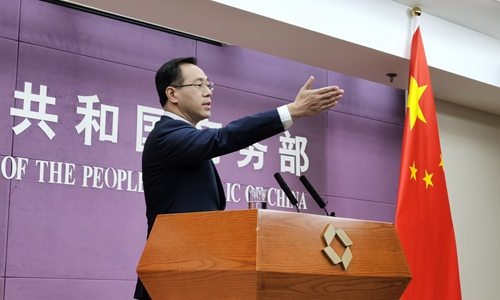
Gao Feng, a spokesperson for the Chinese Ministry of Commerce, calls on reporters to ask questions at a press briefing in Beijing. Photo: Wang Cong/GT
China will handle the anti-dumping and countervailing case of imported Australian barley in accordance with WTO dispute settlement procedures, the Chinese Ministry of Commerce (MOFCOM) said on Thursday, after the WTO agreed to set up a panel of experts to resolve the barley trade dispute between Australia and China.
"The Chinese government has always respected WTO rules and managed its foreign trade in accordance with them. At the same time, China respects New Zealand's right as a WTO member to participate in the trial of relevant dispute cases as a third party," Gao Feng, spokesperson of the MOFCOM, said on Thursday during a press briefing.
The WTO said last week that it would set up a dispute settlement panel to resolve the barley case. And New Zealand's Trade Minister Damien O'Connor said recently that his country was participating in the dispute as a third party.
China launched anti-dumping and countervailing investigations against imported barley from Australia in accordance with the law, following applications from China's domestic industry, Gao said. After one and a half years of investigation, China decided to impose anti-dumping and countervailing duties on Australian barley starting from May 19, 2020, he added.
China has imposed anti-dumping tariffs of up to 73.6 percent and a 6.9 percent countervailing duty on barley imported from Australia for five years, according to an earlier notice from the MOFCOM.
The tariffs have seriously hurt Australian barley. According to Australian official data, it is estimated that the gross value of barley production would be around 30 percent lower in 2025 than what is projected to have occurred without the tariff, due to reduced barley plantings combined with a lower expected price.
Also, asked about G7 trade officials' comments about WTO reforms on Thursday, the MOFCOM spokesperson noted that China supports necessary reform of the WTO to enhance its authority and effectiveness and opposes unilateralism and protectionism.
However, "international economic and trade rules should be jointly formulated by all parties. Rules formulated by one or a few countries should not be imposed on all parties," Gao stressed.
He added that since its accession to the WTO, China has been an active participant, staunch defender and important contributor to the multilateral trading system and has made positive contributions to global trade and investment liberalization and facilitation.
Global Times
